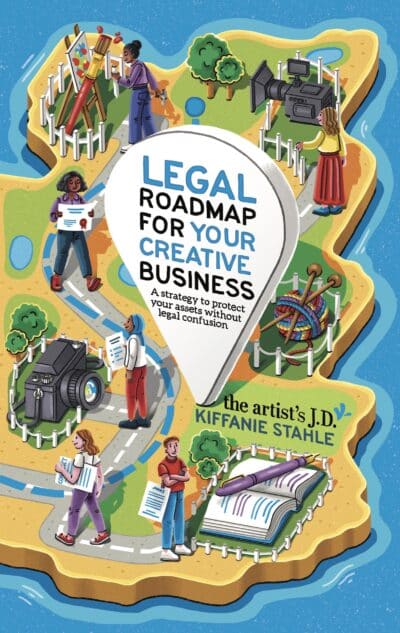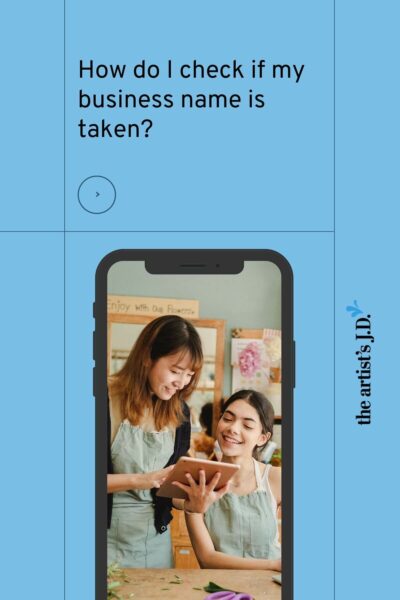You want to keep the momentum going for your creative business. So how do you check if your business name is taken? Because no one wants to pick a name that will get you in legal hot water and force a re-brand.
In this video and post, I share how to check if your business name is taken, why it’s important, and if you can DIY it.
Watch the short version | Read the long version
Watch
Video Links
- Learn my step-by-step process for doing a trademark search here
- Read why I think investing in hiring an attorney for your trademark is smart
- Learn all five steps of the trademark process
- Read Lela Barker’s story and how she learned the hard (and expensive) way that there’s a sweet spot to when you should file your trademark registration application
- Get my help in doing your trademark search
Feeling overwhelmed by the legal side of your business? You’re not alone. Then the Legal Roadmap book is your go-to guide.

Legal Roadmap for Your Creative Business breaks down the essentials (including helping you do your trademark search) into bite-sized, actionable steps that fit into your already busy life.
Designed for creative minds, this book helps you prioritize what really matters—without getting lost in legal jargon.
Whether you’ve been running your creative business on the side or you’re finally ready to take it to the next level, this roadmap is your step-by-step guide to protecting your assets without the headache.
Start adding ease to the legalese today!
(If you use the above Amazon affiliate link, I’ll make a small commission, but it doesn’t change the price you pay.)
How to pick a business name that won’t land you in legal hot water

Many creative business owners start their businesses without even realizing it. They have a creative outlet, an opportunity to collaborate, or a personal project. And it ends up turning into a business.
This is why a couple of times a year, I have to tell a client she has to re-brand her business.
- Sometimes because a creative project or hobby turned into a business.
- Sometimes because she didn’t realize the need to do a trademark search.
- Sometimes because she wanted to capitalize on a trend.
If you name your business something too close to someone else’s trademark, you’ll find out sooner or later. (Usually, in the form of a nasty lawyer-drafted cease and desist letter.)
And when it happens, you’ll have to re-brand. You’ll have to start over from scratch. You’ll have to rebuild brand recognition, business goodwill, and pretty much everything.
This is why it’s critical to check if your business name is taken by someone else ASAP.
Because when you’re growing your creative business, you want to keep building momentum not go back to square one.
And even though the URL or social media accounts are available, doesn’t mean it’s okay to use.
In pre-Internet days, most businesses were local, so this research wasn’t as critical. But these days, the first thing you do is get your business online. And you make sure that Google can find you. You don’t just sell your products locally, but sell your products across the United States (and sometimes to those in other countries).
This means the other business owner with a similar name can easily find you too. And when they do, they’ll likely either send you an email asking you to change your name (or if they are a bigger company, immediately sic their lawyers on you.)
So how can you make sure that you’re picking a name either when you’re first starting out or when you’re rebranding that’s not going to get you in legal hot water?
Can your business name get a trademark?
First off, not every business, product, or service name is capable of getting a trademark.
So the first part is to decide if your business name qualifies for trademark protection.
Contrary to popular belief, trademarks don’t exist to benefit us, the business owner. Trademarks exist to benefit our customers. Trademark laws are a kind of consumer protection law. They exist so consumers know who is providing them with that product or service.
When you understand this, it makes sense what does and doesn’t qualify for trademark protection.
You can’t get a trademark for
- generic terms (like quilts, jewelry, or photography)
- phrases that merely describe the product or service you are offering (like modern quilts or un-corporate headshots)
(You also can’t get a trademark for government symbols or insignia, vulgar or disparaging words or phrases, or immoral, deceptive, or scandalous words or symbols.)
The reason you can’t get a trademark for these things is that once you have a trademark, you can stop others from using it. And we can’t make it impossible for your competitors to use common words or phrases to describe their products.
And while it can be done, it’s also harder to get a trademark when it includes:
- your name or the name of a living person
- a geographic location
- a generic or descriptive term even when paired with a non-descriptive term
(And when you do get a trademark for these terms it usually comes with some caveats.)
The biggest challenge for creatives is the limit on personal names. The reason personal is that people should have the right to do business under their name.
So we usually limit personal name trademarks to those who are household names. And even if you do get this kind of trademark, you can’t stop others with the same name from doing business under their name. (Just if they are trying to trade off your name/status to confuse consumers.)
This means the strongest trademarks are:
- made-up words (e.g. Google)
- words usually used to describe something else rather than the business/product/service it’s being used for (e.g. Apple for computers)
If your name doesn’t qualify for a trademark, then you won’t be able to stop your competitors from using a similar name. And they won’t be able to stop you either.
Limited to those in your lane
The other thing to remember about trademarks is it’s only stopping those if they are in your lane.
Delta is my go-to example here. Delta is a water faucet company, it’s an airline, and it’s a dental insurance company. We allow Delta to be all three because consumers aren’t going to think that the company airline is also selling us dental insurance.
But, if I wanted to start a business called Delta Luggage, then Delta Airlines would be able to stop me. Because people might think that I’m associated with Delta Airlines. Especially, if I’m creating cute, overhead luggage. But Delta Faucets and Delta Dental, wouldn’t be able to stop me because consumers wouldn’t be confused. So Delta Airlines could stop my luggage company, but the other two couldn’t.
If I started a bike company called Delta Bikes, none of them would be able to stop me. Because it’s not closely related to the products and services that they’re offering.
So first you have to decide if your business name qualifies for trademark protection.
Feeling overwhelmed by the legal side of your business? You’re not alone. Then the Legal Roadmap book is your go-to guide.

Legal Roadmap for Your Creative Business breaks down the essentials (including helping you do your trademark search) into bite-sized, actionable steps that fit into your already busy life.
Designed for creative minds, this book helps you prioritize what really matters—without getting lost in legal jargon.
Whether you’ve been running your creative business on the side or you’re finally ready to take it to the next level, this roadmap is your step-by-step guide to protecting your assets without the headache.
Start adding ease to the legalese today!
(If you use the above Amazon affiliate link, I’ll make a small commission, but it doesn’t change the price you pay.)
How to check if my business name is taken

If your product or business name does qualify for a trademark, then you’ll need to do a trademark search.
A trademark search is doing a little research to find out what other businesses are out there with similar names providing similar products or services.
Sadly, a trademark search isn’t a quick and easy process. In fact, I usually set aside an entire morning to do them. But they are the best way to assure you that you won’t have to change your business name once you finally start landing those big accounts or getting press mentions.
The reason these searches take so long is that you aren’t going to the USPTO website and typing in your business name and seeing what appears.
Instead, you have to search three different places:
- the USPTO database
- a domain name database
- a web search (e.g. search via Google or DuckDuckGo)
And your search has to be for both exact business names and similar business names.
The reason you have to search three different places is that, unlike copyrights, trademarks don’t have to be registered to be enforced. Trademarks are old-school playground rules. The first person to plant the flag and say, “I’m using this phrase to offer this product or service” gets to stop everyone that comes afterward. And it doesn’t matter if you’ve registered it or not.
Amazon Bookstore was a feminist bookstore in Minneapolis that started in the 1970s. For almost 30 years, they operated a small bookstore and shipped books around the United States. And then in 1995, Amazon.com came along. And Amazon Bookstore started to spend more and more time and money trying to convince people that they weren’t Amazon.com.
So in 1999, they sued Amazon.com for trademark infringement. While the lawsuit was settled out of court, we do know that Amazon Bookstore ended up being paid a small monetary settlement to give the name to Amazon.com. And they were allowed to continue to use the name for as long as the existing ownership remained the same. (Sadly, like most independent bookstores, the business was sold in 2008, and then closed its doors in 2012.)
Granted, registration makes it a whole lot easier to enforce a trademark. But you can enforce an unregistered trademark, as Jeff Bezos and company learned.
So that’s why it’s important to search all three of these places when we’re trying to find out who else is out there.
And the reason that you can’t do an exact name search, is that remember it’s all about consumer confusion. This means that Great Records, Gr8 Records, and Grate Records could all be confusing to consumers because they sound alike.
If my business was Great Records and I looked for an exact match, then Grate Records which had been around for a decade, wouldn’t come up in my search. But they would be able to stop me from using that business name because it could confuse consumers.
Step-by-step process
I conduct a handful of trademark searches each month and this is the exact process that I work through. This process isn’t easy-breezy, following it to a T takes a lot of work. Even for me, it’s an entire morning project—and I’ve done a lot of them and like doing them.
I’ve also learned that there is an art to doing this kind of search. And the learning curve is steep. Because of that, there is no guarantee that you missed something important.
Usually, when it comes to trademarks I am very anti-DIY. Trademarks are one of those things that I think you should invest in having an attorney do for you.
But I do think you can DIY your trademark search. (That is if you will follow the process to a T. If not, then you should probably hire someone to do it for you.) If you want a little support in this process, this is a great time to reach out to the attorney on your team (or you can hire me to do it for you!)
The three takeaways
Here are your three takeaways:
- Don’t be like Jeff and fail to check who else is out there. When you are just starting your business, you need to do a thorough search to make sure that your business name isn’t taken by someone else. Because trademarks are old-school playground rules. The first person to plant the flag and say, “I’m using this phrase to offer this product or service” gets to stop everyone that comes afterward. And it doesn’t matter if they’ve registered it or not. (Want help doing this search, check out this in-depth DIY resource, buy the Legal Roadmap where we go through it step-by-step, or hire me to do it for you.)
- Don’t be like Amazon Bookstore and don’t register. At a certain point in time in your business, you should spend the money to register your trademarks. Because even though you’ve planted your flag, you make it *harder* to stop others without a trademark registration. That being said, trademarks are one of those things that I think you should invest in having an attorney do for you. I explain why I’m anti-DIY trademark registration and how much to save in this post.
- Be like Amazon Bookstore and defend your ground. Granted, Amazon was not the giant they are today in 1999 when Amazon Bookstore sued them. But they still weren’t small potatoes. But Amazon Bookstore stood up for their rights and didn’t roll over. They had worked hard to build up their reputation and defended it when push came to shove. So once you register your trademark it’s important to start a fund that you can use to defend your trademark if anyone starts stepping on your toes. (Because if you don’t defend it, it can be canceled.)
Feeling overwhelmed by the legal side of your business? You’re not alone. Then the Legal Roadmap book is your go-to guide.

Legal Roadmap for Your Creative Business breaks down the essentials (including helping you do your trademark search) into bite-sized, actionable steps that fit into your already busy life.
Designed for creative minds, this book helps you prioritize what really matters—without getting lost in legal jargon.
Whether you’ve been running your creative business on the side or you’re finally ready to take it to the next level, this roadmap is your step-by-step guide to protecting your assets without the headache.
Start adding ease to the legalese today!
(If you use the above Amazon affiliate link, I’ll make a small commission, but it doesn’t change the price you pay.)

Hi! I’m Kiff! I’m your friendly legal eagle (and licensed attorney).
My goal is to add ease to the legalese. And because I think basic legal resources should be available to every creative, I create a lot of free content.
If I’ve created something that has helped inject a little ease into your creative business and you would like to say “thank you”, you can make a contribution here.
If you’d like to hear more from me, I’d love to pop into your inbox every Friday morning to share additional ways to cut through the red tape and inject a little ease.
Get tips from your friendly legal eagle in your inbox…
Your privacy is important to us. Learn how we protect it here.
Do you still have questions?
No shame in that! One of the perks of membership in the artist’s Courtyard is a 24/7 private online community to ask your questions and get my answer (and insights from other creatives). Already a member? Ask your question! Not a member yet? Join us inside the artist’s Courtyard for $45/month!
Feeling overwhelmed by the legal side of your business? You’re not alone. Then the Legal Roadmap book is your go-to guide.

Legal Roadmap for Your Creative Business breaks down the essentials (including helping you do your trademark search) into bite-sized, actionable steps that fit into your already busy life.
Designed for creative minds, this book helps you prioritize what really matters—without getting lost in legal jargon.
Whether you’ve been running your creative business on the side or you’re finally ready to take it to the next level, this roadmap is your step-by-step guide to protecting your assets without the headache.
Start adding ease to the legalese today!
(If you use the above Amazon affiliate link, I’ll make a small commission, but it doesn’t change the price you pay.)

